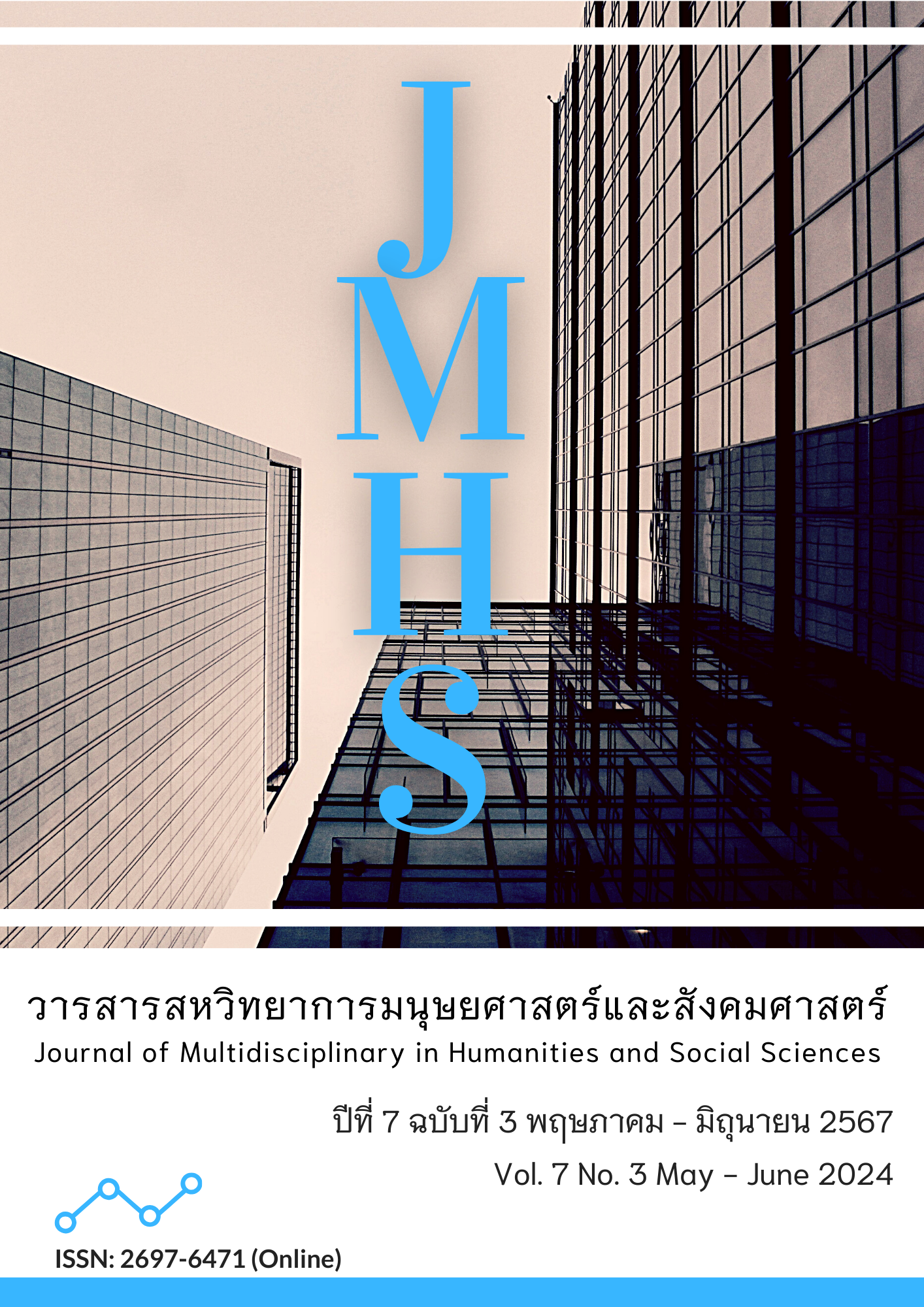Research on Light Installation Art Design within the Context of Regional Culture: A Case Study at the Guangzhou International Light Festival
Main Article Content
Abstract
This article aimed to conduct a design study on light installation artworks incorporating regional culture at the Guangzhou International Light Festival. The research was to explore the methodology of designing light installations that are rich in regional cultural characteristics and provide guidelines for artists and creators in this context. The sample of artworks comprised three selected installations from the Guangzhou International Light Festival, while interviews were conducted with 12 audience members, 6 creators, and 1 curator who participated in the festival in 2023. The instruments used for data collection included fieldwork, case studies, and in-depth interviews, guided by Theories of Visual Cultural Studies and WJT Mitchell's Theory of the Image. Data analysis employed descriptive statistics and content analysis.
The research findings indicated that the design of light installation artworks rich in regional culture involves a seven-step process. During the creation process, it is essential to consider the social and historical nature of the work, the audience's interpretation, behavior, and feedback. The tangible representation of visual symbols and the abstract expression of cultural elements emerge as effective means to showcase regional culture in light installation artworks.
In conclusion, the study shed light on the intricate process of incorporating regional culture into light installation art and provided valuable insights for artists and creators. The identified steps and considerations contribute to a comprehensive understanding of how to infuse cultural richness into these artworks, enhancing their significance and impact within the context of festivals like the Guangzhou International Light Festival.
Article Details

This work is licensed under a Creative Commons Attribution-NonCommercial-NoDerivatives 4.0 International License.
Views and opinions appearing in the Journal it is the responsibility of the author of the article, and does not constitute the view and responsibility of the editorial team.
References
Alves, T. (2007). Art, Light and Landscape New Agendas for Urban Development. European Planning Studies, 15(9), 1247-1260. https://doi.org/10.1080/09654310701529243
Bhatia, M. (2022). Light Festivals: Entertainment or Urban Renewal Tool? IOP Conference Series: Earth and Environmental Science, 1099, 012009. https://doi.org/10.1088/1755-1315/1099 /1/012009
Chhikara, A. (2020). Rayuela: Delivering Serious Information Through Playful Interactive Installations. TEI 2020: Proceedings of the 14th International Conference on Tangible, Embedded, and Embodied Interaction, 661–667. https://doi.org/10.1145/3374920.337 5288
Giordano, E., & Ong, C. E. (2017). Light Festivals, Policy Mobilities and Urban Tourism. Tourism Geographies, 19(5), 699-716. https://doi.org/10.1080/14616688.2017.1300936
Kontogeorgakopoulos, A., & Klissouras, O. (2021). Temporal Transformations and Spatial Explorations in Sound-Light Art. In ICMC 2021 - Proceedings of the International Computer Music Conference 2021. Michigan: Michigan Publishing Services.
Liu, H., Liu, Y., & Cao, L. (2013). Study of Light Installation Art in Space Design. Lecture Notes in Electrical Engineering, 207, 537-544.
Mao, L., Lu, C., Sun, G., Zhang, C., & Guo, C. (2024). Regional Culture and Corporate Finance: A Literature Review. Humanities and Social Sciences Communications, 11(1), Article 59. https://doi.org/10.1057/s41599-023-02551-8
Mitchell, W. T. (1995). Interdisciplinarity and Visual Culture. Art Bulletin, 77(4), 540-544.
Mo, F., & Chandhasa, R. (2023). Research on Elements of Rural Environmental Design in China from the Perspective of Regional Culture. Kurdish Studies, 11(2), 3054-3063. https://doi.org/10.58262/ks.v11i2.223
Smith, M. (2005). Visual Studies, Or the Ossification of Thought. Journal of Visual Culture, 4(2), 237-256.
https://doi.org/10.1177/1470412905057350
Sookkaew, J., Chaikaew, N., & Changjaikla, P. (2023). Interactive Light Art: The Illumination of Art and Technology Merging. International Journal of Engineering Trends and Technology, 71(12), 308-323. https://doi.org/10.14445/22315381/IJETT-V71I12P229
Yin, S. H., Fu, C. Z., & Dai, G. Q. (2023). Exploring the Festival Attendees' Experiences on Social Media: A Study on the Guangzhou International Light Festival. Sage Open, 13(1). https://doi.org/10.1177/21582440221145154
Zaeva-Burdonskaya, E. A., & Nazarov, Y. V. (2022). Light Design in Russian Universities: What and How to Teach? Light and Engineering, 30(1), 91-100. https://doi.org/10.33383/2021-095


